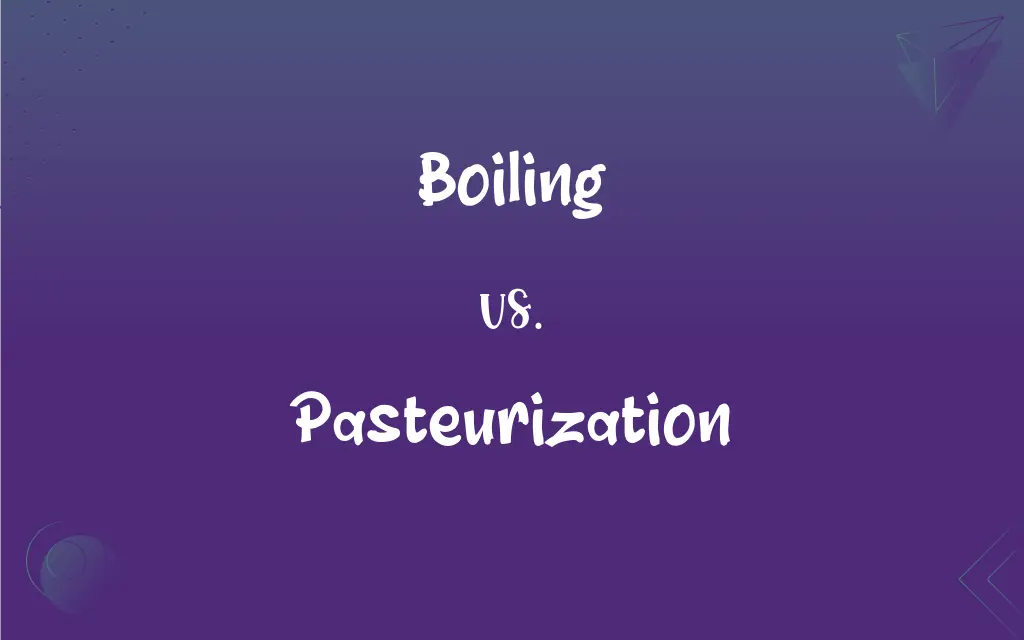Boiling vs. Pasteurization: What's the Difference?
Edited by Aimie Carlson || By Harlon Moss || Published on December 1, 2023
Boiling is heating a liquid to its boiling point, causing vaporization, while pasteurization is heating food, typically liquid, to a specific temperature below boiling to kill pathogens.

Key Differences
Boiling involves heating a liquid until it reaches its boiling point and begins to vaporize. Pasteurization, on the other hand, heats food to a temperature that kills harmful microorganisms but is below the boiling point.
The boiling point of water is 100°C (212°F) at sea level, and this is the temperature where boiling occurs. Pasteurization typically occurs at temperatures between 60°C (140°F) and 85°C (185°F), depending on the method used.
Boiling is a quicker process, where the change happens as soon as the liquid reaches the boiling point. Pasteurization requires maintaining the temperature for a specific duration to ensure microorganism destruction.
Boiling is generally used for cooking, sterilization, or purification. Pasteurization is specifically used to extend the shelf life of food products and make them safe for consumption by destroying pathogens.
Boiling can alter the taste, texture, and nutritional value of food. Pasteurization aims to minimize these changes while ensuring food safety.
ADVERTISEMENT
Comparison Chart
Temperature
100°C (212°F) at sea level
Between 60°C (140°F) and 85°C (185°F)
Duration
Quick, happens at boiling point
Time-specific, maintained for effectiveness
Purpose
Cooking, sterilization, purification
Extend shelf life, ensure food safety
Microorganism Effect
Kills most microorganisms
Kills specific harmful pathogens
Impact on Food Quality
Can alter taste, texture, nutrition
Minimal changes, preserves quality
ADVERTISEMENT
Boiling and Pasteurization Definitions
Boiling
A method of sterilization by heat.
Boiling the instruments sterilizes them.
Pasteurization
A process to extend the shelf life of food products.
Juice undergoes pasteurization to last longer.
Boiling
Heating a liquid until it reaches its vaporization point.
She was boiling water for tea.
Pasteurization
Heating food to kill harmful microorganisms.
Pasteurization is essential for milk safety.
Boiling
Reaching a temperature where a liquid forms bubbles.
The soup started boiling after a few minutes.
Pasteurization
A technique developed by Louis Pasteur.
Pasteurization revolutionized food preservation.
Boiling
Used metaphorically to describe extreme anger or agitation.
His temper was boiling over the unfair decision.
Pasteurization
Heating liquid below boiling to preserve quality.
Pasteurization retains the nutrients in milk.
Boiling
The process of a liquid turning into vapor when heated.
Boiling is a common cooking method.
Pasteurization
Used in dairy and juice industries for safety.
Pasteurization is a standard practice in dairy processing.
Boiling
Heated to or past the boiling point
A kettle of boiling water.
Pasteurization
The act or process of heating a food, especially a beverage such as milk or beer, to a specific temperature for a specific period of time in order to kill microorganisms that could cause disease, spoilage, or undesired fermentation.
Boiling
Very angry or upset; seething.
Pasteurization
The act or process of destroying most microorganisms in certain foods, such as raw meat or fresh fruits and vegetables, by irradiating them with gamma rays or other radiation to prevent spoilage.
Pasteurization
Alternative spelling of pasteurisation
Pasteurization
A process devised by Pasteur for preventing or checking fermentation in fluids, such as wines, milk, etc., by exposure to a temperature of 140° F., thus destroying the vitality of the contained microorganisms.
Pasteurization
Partial sterilization of foods at a temperature that destroys harmful microorganisms without major changes in the chemistry of the food
FAQs
What is pasteurization?
A process of heating food to a specific temperature to kill pathogens.
Does pasteurization change the taste of milk?
It slightly alters the taste but maintains most of the milk's quality.
How does boiling purify water?
It kills most microorganisms present in the water.
What is boiling?
Heating a liquid to its vaporization point, typically 100°C for water.
Is boiling enough to sterilize medical instruments?
Yes, but autoclaving is more effective for complete sterilization.
Can boiling be used for food preservation?
Yes, but it's less effective than pasteurization for long-term preservation.
Is pasteurization only used for milk?
No, it's also used for other liquids like juice and wine.
Does boiling remove chemicals from water?
It can remove some volatile compounds, but not all chemicals.
What are the types of pasteurization?
High-temperature short time (HTST) and ultra-high temperature (UHT) are common types.
What is the boiling point of water at high altitude?
It's lower than 100°C due to decreased atmospheric pressure.
Can pasteurization kill all bacteria in food?
It kills harmful bacteria, but not all microorganisms.
Does pasteurization affect the nutritional value of food?
It minimally affects nutrients, preserving most of the food's nutritional value.
Is pasteurized food completely sterile?
Not sterile, but safe from harmful pathogens.
Why does salt increase the boiling point of water?
It raises the temperature at which water boils (boiling point elevation).
Can boiling water freeze faster than cold water (Mpemba effect)?
Under some conditions, this can occur, though it's not fully understood.
Can you boil any liquid?
Most liquids can boil, but at different temperatures.
How long should water be boiled for purification?
Boiling for at least one minute is recommended.
Is raw milk safer than pasteurized milk?
No, raw milk poses a higher risk of containing harmful bacteria.
Is pasteurization used for beer production?
Yes, it's used to stabilize beer and extend its shelf life.
Are there any risks associated with pasteurization?
It's a safe process, though over-pasteurization can reduce food quality.
About Author
Written by
Harlon MossHarlon is a seasoned quality moderator and accomplished content writer for Difference Wiki. An alumnus of the prestigious University of California, he earned his degree in Computer Science. Leveraging his academic background, Harlon brings a meticulous and informed perspective to his work, ensuring content accuracy and excellence.
Edited by
Aimie CarlsonAimie Carlson, holding a master's degree in English literature, is a fervent English language enthusiast. She lends her writing talents to Difference Wiki, a prominent website that specializes in comparisons, offering readers insightful analyses that both captivate and inform.






































































